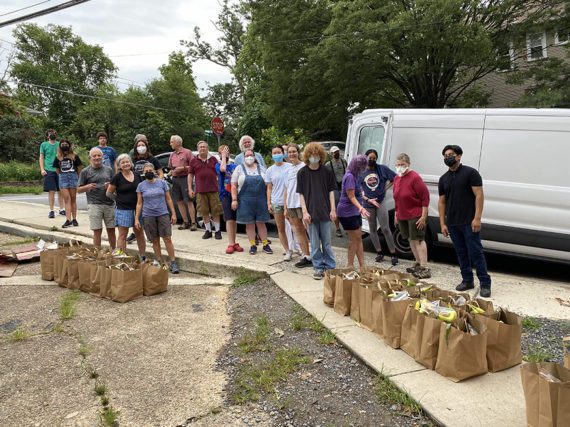Every Friday at 7:30 a.m., as many as 100 volunteers with the Small Things Matter (STM) Kokua Foods Program, a nonprofit food recovery operation in Montgomery County, Maryland, gather to pack shopping bags of fresh produce for distribution later in the morning.
The clients at STM are primarily people of color, including immigrant families and seniors. The volunteers are primarily retirees and students, the latter earning credits for service learning that are required for their high school diplomas.
The Environmental Protection Agency reported in 2021 that the largest share of U.S. food waste is fresh produce. Small Things Matter is part of a growing national effort to reduce waste while providing people with nutritious food. It embodies Bread for the World’s principles for the upcoming 2023 farm bill reauthorization: nutrition, equity, and sustainability.
Partnerships with area grocery chains are the source of most of STM’s food donations. The nonprofit serves between 4,000 and 5,000 people each week, distributing between 10,000 and 15,000 pounds of food. The bulk of it is fresh produce and nonperishable staples. Clients prize the fresh produce since it’s difficult to stretch their own grocery budgets to include these more expensive items.
Imperfect Foods, one of STM’s largest donors, is a national grocery delivery service that offers high-quality fresh produce with “imperfections” at discount prices. The so-called imperfections are cosmetic blemishes—for example, a pepper that is not quite the right shape—that don’t affect the taste or nutritional content of the fruit or vegetable.
Imperfect Foods’ successful business model led to rapid expansion, so that now it is able to support food recovery organizations like STM. Grocery store chains such as Wegmans and Trader Joe’s have followed suit, increasing the quantities of produce, dairy, and meat that are rescued.
The founder of STM is Lana Anderson, a recent high school graduate who established the nonprofit in 2017 while she was still in middle school. Anderson started college this fall at the University of Maryland and is now co-executive director alongside her mother, Roxanne Yamashita, who organizes the volunteers and manages the Kokua Food Program. Yamashita was born in Hawai’i, and they named the program for a Hawai’ian word meaning “to give selflessly.”
In 2011 at the University of Maryland, a small student-led food recovery group began working to reroute unused food from campus dining halls to local shelters and kitchens. That effort led to the creation of the Food Recovery Network, which now has more than 200 college campus chapters, making it the largest student-led movement in the United States focused on reducing food waste and providing nutritious food to people in need.
Food recovery programs like STM and chapters of the Food Recovery Network are not a replacement for the Supplemental Nutrition Assistance Program, better known as SNAP, or other federal nutrition programs. SNAP is the first line of defense against hunger in the United States. Montgomery County, Maryland, where STM is located, has one of the highest minimum wages in the United States, but it is extremely difficult to live on a minimum-wage job anywhere in the country.
Millions of workers from throughout the United States participate in SNAP to help put food on the table. Many people in STM’s local area who receive its produce, both workers and seniors, also participate in SNAP.
But SNAP benefits are simply not enough to enable people to eat a healthy diet all month. It is also important to strengthen food recovery efforts like STM’s Kokua Food Program. In the upcoming farm bill reauthorization, Congress could allocate additional resources to help these groups expand and reach more people facing food insecurity.
The farm bill could also encourage and make it simpler for farmers to donate surplus crops. In 2019, 16.7 million tons of produce went to waste on farms, with only a tiny fraction of it—1.7 percent— reaching people in need.
As farm bill reauthorization gets underway, Bread for the World members can help make sure these improvements are enacted by vigorously advocating for them.
Todd Post is senior domestic policy advisor with Bread for the World.



